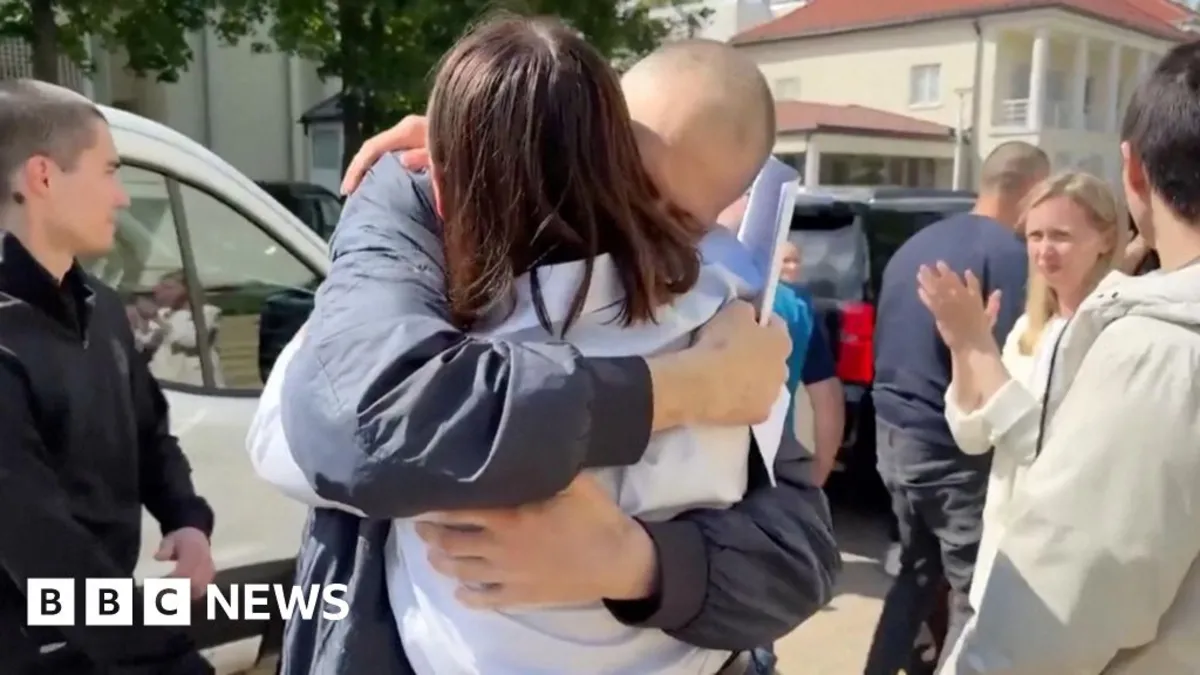
The husband of Belarusian opposition leader Svetlana Tikhanovskaya, Sergei Tikhanovsky, has been unexpectedly released from prison in Belarus, along with 13 other political prisoners. This significant turn of events follows his five-year incarceration and marks a pivotal moment for the Belarusian opposition. Tikhanovsky was moved to Lithuania, where he was joyfully reunited with his wife, who has been living in exile in the capital, Vilnius.
Svetlana Tikhanovskaya announced her husband's release via a heartfelt 10-second video, capturing their first embrace since 2020. She expressed her overwhelming joy in the video, stating it was difficult to articulate the happiness in her heart. This unexpected release coincided with a visit to Minsk by US special envoy Keith Kellogg, who met with the authoritarian leader of Belarus, Alexander Lukashenko.
A statement from the Lithuanian foreign minister confirmed that 14 political prisoners were released and are currently receiving care in Lithuania. Among those freed, five were Belarusian nationals, while others included individuals from Japan, Poland, and Sweden. However, Tikhanovsky's release stands out as the most prominent case, given his previous role as a vocal opposition figure in Belarus.
Prior to his arrest, Tikhanovsky was known for his colorful and outspoken social media presence. He famously referred to Lukashenko as "the cockroach," urging citizens to rise against the regime. Ignoring the risks posed by Belarus' repressive government, he traveled the country to engage with citizens, gathering and broadcasting their concerns. His activism led to his arrest in 2020, as he launched his campaign to challenge Lukashenko in the presidential elections that summer. In 2021, he was sentenced to 18 years in prison for allegedly inciting mass protests against the regime.
In Tikhanovsky's absence, Svetlana Tikhanovskaya stepped up as a political candidate, despite being a political novice. After Lukashenko declared a controversial landslide victory in the elections, her supporters took to the streets in unprecedented numbers, resulting in violent crackdowns on protests. Forced into exile, Tikhanovskaya has continued to advocate for democracy in Belarus.
While the release of Tikhanovsky is celebrated, other prominent opposition leaders, such as Maria Kolesnikova, remain imprisoned. Kolesnikova's sister confirmed that she was not among those released, emphasizing the need for further negotiations to secure the freedom of more political prisoners.
In the video shared by Tikhanovskaya, Tikhanovsky appears visibly changed. Although he smiles broadly, he has lost significant weight and looks thinner than before his imprisonment. Franak Viacorka, a senior adviser to Tikhanovskaya, described the release as a moment of unexpected joy, stating, “We didn’t expect his release; we were struggling for it, but this was a complete surprise.” He noted that despite his physical transformation, Tikhanovsky's passion and energy remain intact.
Following the announcement, Tikhanovskaya expressed her gratitude on social media, thanking US President Donald Trump, Keith Kellogg, and European allies for their roles in securing her husband's freedom. Despite this positive development, she reminded her followers that over 1,150 political prisoners still languish in Belarusian jails, advocating for their release as well.
Experts suggest that Tikhanovsky's release may reflect a shifting dynamic in Belarusian politics. Viacorka indicated that Lukashenko might be seeking to improve relations with the new American administration. Artyom Shraibman from the Carnegie Russia Eurasia Center noted that Kellogg's visit could be seen as a significant diplomatic breakthrough for Lukashenko, who has faced isolation from Western nations following his disputed elections and the regime's support of Russia during its invasion of Ukraine.
Despite this release, Shraibman warns that it does not signify the end of political repression in Belarus. Many individuals remain imprisoned solely for opposing Lukashenko's rule, while reports of ongoing threats from the KGB security service suggest that the climate of fear persists.
As Tikhanovsky adjusts to life in exile in Lithuania, his future role within the Belarusian democratic opposition remains uncertain, especially with his wife now recognized as the international leader of the movement. This transition may introduce complexities to the opposition's structure and strategy.
Among the other political prisoners released was Natalia Dulina, a 60-year-old professor who had been imprisoned since 2022. She described her sudden transfer from prison and the surprise of her release, emphasizing the ongoing struggles faced by those who oppose the regime. With hundreds of thousands of Belarusians having fled the country since 2020, the fight for democracy in Belarus continues amid a backdrop of political turmoil and repression.